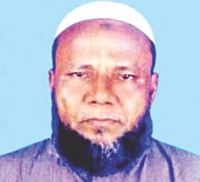Mobarak's war crimes trial ends
Mobarak's war crimes trial ends
Verdict any day

The International Crimes Tribunal-1 may deliver verdict in the war crimes case against Mobarak Hossain, a leader of Brahmanbaria Awami League, any day as the trail proceedings concluded yesterday.
With the completion of proceedings in Mobark's case, four war crimes cases are now waiting for verdict delivery at two tribunals conducting trial of war crimes accused.
The accused are facing charges of crimes against humanity and genocide committed during the Liberation War in 1971.
On March 24, Tribunal-1 kept the case against Jamaat Chief Motiur Rahman Nizami waiting for verdict delivery for the second time.
It had also kept the case against Faridpur BNP leader Zahid Hossain Khokon awaiting judgment on April 17.
Tribunal-2 kept the case against Jamaat leader Mir Quasem Ali waiting for verdict delivery on May 4.
Tribunal-1 had completed Nizami's case proceeding on November 13 last year. But the then tribunal chairman Justice ATM Fazle Kabir went on retirement. The new chairman of the tribunal, appointed on February 23, decided to re-hear the closing arguments.
Yesterday, the three-member Tribunal-1 led by its Chairman Justice M Enayetur Rahim kept Mobarak's case on CAV [Curia Advisari Vult, a Latin legal term meaning verdict could be delivered anytime] after hearing two petitions submitted by the prosecution.
One of the petitions was forwarded to revise a 'clerical' mistake in the indictment order.
On November 11, 1971, Mobarak and his armed associates abducted Abdul Khaleque of Satian village at about 9:00 pm and took him to the Razakar camp of Suhilpur Union Parishad.
Khaleque, a pro-liberation Ansar member, faced torture and was eventually killed, according to the charges pressed against Mobarak.
The prosecution told the tribunal that it would be 9:00 am instead of 9:00 pm and prayed to the court to revise it.
In the other petition, the prosecution submitted an explanation sought by the tribunal on the authenticity of a list of Brahmanbaria's Razakar members and also prayed to the court to keep it on record.
Opposing the petition, defence counsel Tajul Islam argued that they had cross-examined the witnesses and placed their arguments according to the time frame.
He said the prosecution would be highly prejudiced if it was revised. After hearing both the sides, the tribunal allowed the two petitions.
Mobarak, the 64-year-old accused, also served as the organising secretary of a union parishad unit of Awami League for 16 years till 2012.
While serving as a Jamaat member during the Liberation War, he was involved in murder, abduction, confinement, torture and loot, according to the charges.
Mobarak, as a commander of Razakar force, substantially “participated in”, “contributed to” and “facilitated” the commission of crimes in different parts of Brahmanbaria in 1971.
In the closing arguments, the prosecution appealed to the tribunal to award him capital punishment for his crimes against humanity during the war.
The defence sought his acquittal claiming that the prosecutors had failed to prove the charges brought against their client.
If found guilty, Mobarak, now behind the bars, may walk the gallows.
Eleven witnesses testified against the war crimes accused while the two -- Mobarak and his son -- testified in defence.
On April 23 last year, the tribunal indicted Mobarak, who was organising secretary of Mugra union unit of AL in Akhaura upazila of Brahmanbaria, for his war crimes.
Khodeja Begum, daughter of Abdul Khalek, filed a case with a Brahmanbaria court in 2009. The case was later transferred to the Tribunal-1.
An investigation agency, designated to probe war crimes, on January 23 last year completed the probe into Mobarak's alleged involvement in crimes against humanity.
The prosecution submitted formal charges against him on February 25, 2013 and the court took the charges into cognisance on March 12 the same year.
So far, the two tribunals delivered judgments in nine war crimes cases while three cases are pending with the courts.
CHARGES
On August 22, 1971, Mobarak and his accomplices had called a meeting at the house of Noor Box at Tanmandayl and around 130 people assembled there.
As part of their plan they raided some houses, abducted villagers and took them to a Pakistani army camp near Ganga Sagar Dighi.
Later, Mobarak and his associates selected 33 people and confined them to Terojhuri Hazat Khana. The following day Pakistani army and Razakars took them to the west bank of Ganga Sagar Dighi, compelled them to dig a ditch, gunned them down and buried them there.
During the war, Mobarak and other anti-liberation people captured Anandamoyee Kalibari, a Hindu temple, which was renamed as Razakar Manzil, looted valuables and damaged its idols.
On October 24, 1971, Mobarak abducted college student Ashu Ranjan of Shimrayl village and shot him dead four days later.
On November 11, 1971, Mobarak and his armed associates abducted Abdul Khaleque of Satian village, took him to the Razakar camp of Suhilpur Union Parishad and tortured him.
The accused shot him and also charged bayonet to confirm his death.
On November 24/25, 1971, a Razakar team led by Mobarak abducted Khadem Hossain Khan of Kharampur and brutally tortured him.
On November 28/29, 1971, Mobarak along with the Pakistani army abducted Abdul Malek of Kharampur and Mohammad Siraj of Amirpara and killed them by gunshots on December 6, 1971.